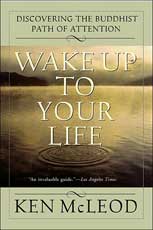Suffering
"The first noble truth is the truth of suffering: there is suffering. Suffering is the central problem of human experience. Buddha did not ignore suffering or try to explain it away as an unfortunate side effect of a divine plan or cosmic order. Suffering was, for him, the central issue.
"And it is still the central issue today. So, what is suffering? The Sanskrit term is dukha, a term that refers to the unsatisfying quality of experience. It is a general term that covers everything from vague feelings of unease to extreme physical and emotional agony. Suffering, as it is used in the first noble truth, refers to any sense of discomfort. We all experience discomfort, whether it is the slight uneasiness of embarrassment or the intense pain of bone cancer. When discomfort arises, our first impulse is to put an end to it, to stop it any way we can. We are, in effect, trying to separate from what we are experiencing, and, by doing so, we separate from life and from the mystery of being. The first noble truth is basically an injunction not to ignore or dismiss what we experience.
"Suffering arises in three ways: from pain, from change, and from existence itself.
"The first kind of suffering is the suffering of physical or emotional pain. When we encounter physical pain, we reactively try to avoid, control, or stop it. Burning a finger on a stove is very painful. We plunge the finger into cold water so that it will stop hurting.
The second kind of suffering is the suffering of change. When change takes place in our lives, internal and external structures are dismantled, either by choice or by force of circumstances. A relationship comes to an end. Our children go to college. We take on a new job with new responsibilities.
Even when we welcome change because it creates new possibilities, we still feel discomfort as the old structures come down. At first, the new job is exciting — more responsibility, more money, better opportunities. At the same time, all that is familiar is gone — it's a new office, with new people, new pressures, and new expectations we aren't sure we can meet.
"The discomfort we feel in the face of change is the suffering of change.
The third kind of suffering is the suffering of existence itself. We believe that we exist, yet if we ask, 'What am I?' we find no answer beyond the roles and functions that we fill in life. We feel empty inside or separate from what we experience, and we react with fear and doubt.
Even when everything is going well in our lives — when we are happy and fulfilled with our family and our work — a small doubt or fear lingers. Is this who I am? Is this all there is to life? Am I really all alone? The suffering of existence is the discomfort we experience from our fears and doubts about what we are or are not.
"The first noble truth says that suffering is pervasive. It invites us not to ignore or avoid it, but to look at it, know what it is, and understand how it arises."
